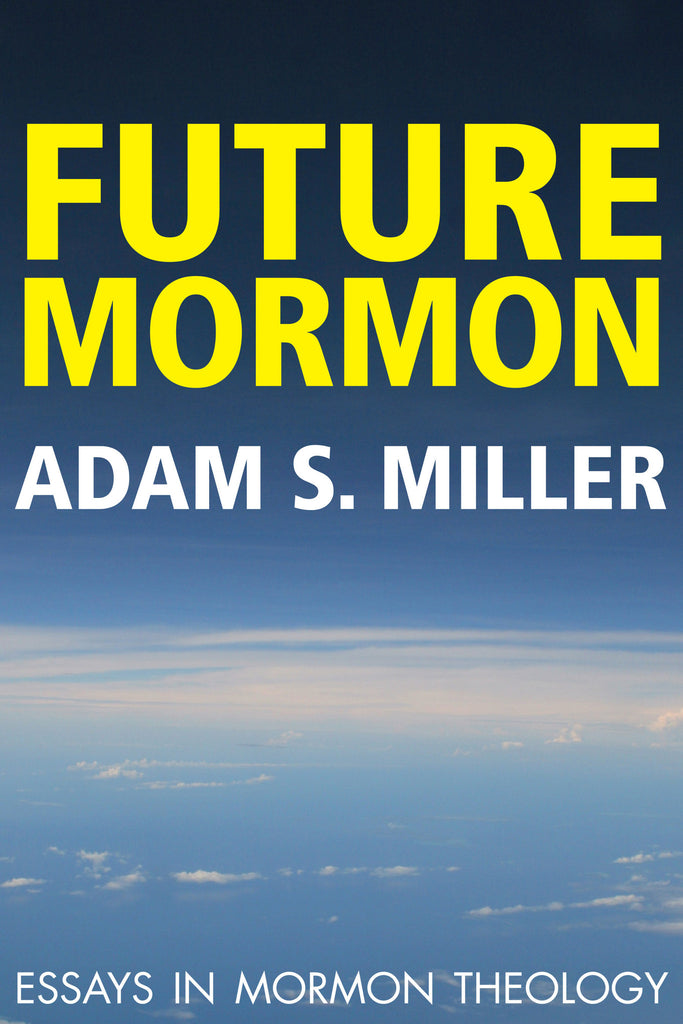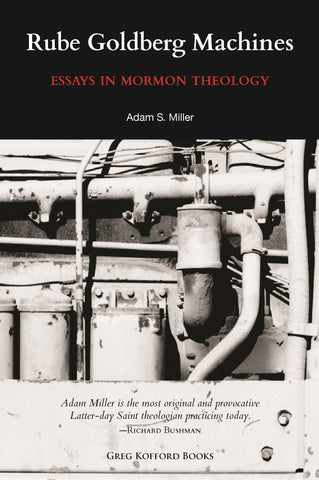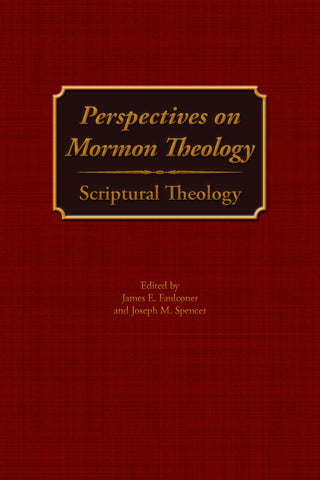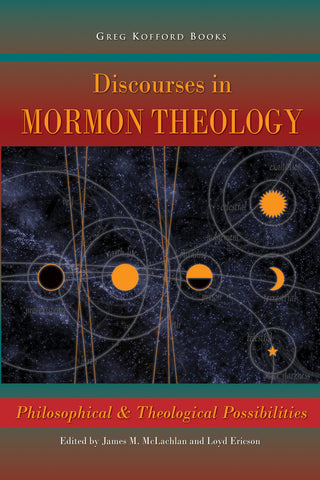Future Mormon: Essays in Mormon Theology
$18.95
- “Represents some of the most careful, creative, and charitable work going on in Mormon theology today.... Go read this book.” — Association for Mormon Letters
- “One of the most intriguing reads I’ve encountered in LDS studies.” — Interpreter: A Journal of Mormon Scripture
- “Miller’s theses are bold, insightful, and provocative, and they are laid out in clear language and arguments. . . . those interested in Mormon theology must read this book, and many others ought to.” — BYU Studies Quarterly



Available in ebook for Kindle, Nook, Kobo, Google Play, and Apple.
Also available through Amazon.
Download a free sample preview.
From the Introduction:
I have three children, a girl and two boys. Our worlds overlap but, already, these worlds are not the same. Their worlds, the worlds that they will grow to fill, are already taking leave of mine. Their futures are already wedged into our present. This is both heartening and frightening. So much of our world deserves to be left. So much of it deserves to be scrapped and recycled. But, too, this scares me. I worry that a lot of what has mattered most to me in this world—Mormonism in particular—may be largely unintelligible to them in theirs. This problem isn’t new, but it is perpetually urgent. Every generation must start again. Every generation must work out their own salvation. Every generation must live its own lives and think its own thoughts and receive its own revelations. And, if Mormonism continues to matter, it will be because they, rather than leaving, were willing to be Mormon all over again. Like our grandparents, like our parents, and like us, they will have to rethink the whole tradition, from top to bottom, right from the beginning, and make it their own in order to embody Christ anew in this passing world. To the degree that we can help, our job is to model that work in love and then offer them the tools, the raw materials, and the room to do it themselves.
These essays are a modest contribution in this vein, a future tense apologetics meant for future Mormons. They model, I hope, a thoughtful and creative engagement with Mormon ideas while sketching, without obligation, possible directions for future thinking.
AuthorCast Interview with the Author:
Comprehensive Table of Contents:
.
Acknowledgements
Introduction: A Future Tense Apologetics
1. A General Theory of Grace
The Three Pillars of Eternity
The Terror of Grace
A Broken Law
Fulfilling the Law
Be Ye Perfect
2. Burnt Offerings: Reading 1 Nephi 1
Lehi in the Desert
Lehi with a Book
The Mysteries of God
3. Reading Signs or Repeating Symptoms: Reading Jacob 7
The Scene
Jacob’s Symptom
Sherem’s Position
Signs from Heaven
Reclamation
4. Early Onset Postmortality
5. The God Who Weeps: Notes, Amens, and Disagreements
Practicing Faith
Saving Satisfaction
Weighing Preexistence
Defending Darwin
Distributing Agency
6. A Radical Mormon Materialism: Reading Wrestling the Angel
Radical Materialism, Latent Idealism
A Working Definition of Materialism
Law, Atonement, Materiality
7. Reflections on President Uchtdorf’s “The Gift of Grace”
8. A Manifesto for the Future of Mormon Thinking
Fearless Mormon Thinking
Transfiguring the Secular
Transfiguring Subjectivity
9. Network Theology: Is it Possible to be a Christian but not a Platonist?
Introduction
What is Network Thinking?
What if God is not a king?
What if truth is an ongoing process, not a static product?
What if grace is immanent?
What if the soul is a network?
10. Jesus, Trauma, and Psychoanalytic Technique
Overture
The Fundamentals of Technique
Divine Trauma
Conclusion
11. Every Truth is a Work, Every Object is a Covenant
12. The Body of Christ
13. Silence, Witness, and Absolute Rock: Reading Cormac McCarthy
The Dreamer
The Mute
The Witness
Bibliography
Index
Q&A with the Author:
.
Q: Why the title, “Future Mormon”?
It is difficult to be contemporary. Historians can avoid the trouble of being contemporary by writing about history and the history of ideas. But as a philosopher and theologian, I think the other tack is more appropriate. Rather than taking shelter in the past, my work takes shelter in the future. It takes future Mormons as it audience. I can't claim any kind of authority in the present, but my hope is that my work might be useful down the road for my grandchildren and great grandchildren. No one, right now, is asking me to write anything or think harder about anything. That's understandable. But maybe I can still be useful and leave something behind that could be helpful in the future.
Q: How does this new volume differ from Rube Goldberg Machines?
Future Mormon is, I think, a stronger collection of essays. They are more tightly integrated around a handful of key themes and, while they frequently remain academic in spirit, they are, in general, less playful or poetic and more straightforward than some of the material in Rube Goldberg Machines.
Q: In the introduction you describe your book as a “future-tense apologetics.” In what ways is your book apologetic, and how does it differ from how apologetics is traditionally understood?
The book is apologetic in that it offers a defense of Mormonism. But it is different from conventional forms of apologetics because it doesn't attempt to defend Mormonism against the specifics of any past or present criticisms. Rather than supplying specific answers to specific questions, I think these essays, instead, try to gather potential tools and resources that future Mormons may need to tackle problems that, for us, may be only barely perceptible at present.
Q: When you look at the generations coming up, what do you suspect will be the most pressing issues for them as they navigate their relationship with Mormonism? And how does Future Mormon address those issues?
The most pressing issue will be Christ. Future generations will have to—just as we must—figure out how to not just talk about Christ but live life in Christ. Life in Christ is the perpetual challenge. They, however, will also have to figure out what such a life looks like in a world that, increasingly, takes sexual, racial, and economic equality seriously, all while dealing with profound and planet-wide ecological changes.
Q: As does much of your work, this book focuses a good deal on grace. This is a topic that has received much more traction in Mormonism today than it did in the past. Why do you think this is the case, and how does your understanding of grace differ from how Mormons generally view it?
Grace is just one way of talking about what life in Christ looks like. But it is a good way. It is language native to Christianity's earliest and most influential expression. For my part, I think that Mormons generally use the word in a way that is still too narrow, still too secondary. We need something like a general theory of grace. In this book, I try to open up some accessible lines that could help us think about what a general theory of grace would involve.
Q: In one of your essays, you say that Mormons need to learn to be more Pauline. In the last several decades there has been a growing interest in Paul by philosophers--and even atheist philosophers. What has drawn their interest, and what is it about Paul that Mormons have generally failed to learn from?
Paul's message, as an apostle of Christ, has perennial traction, with Christians and non-Christians alike. In his letters Paul is trying to describe what a certain kind of life, an awakened and liberated life, looks like. This kind of life—whether someone comes to it by way of the Christian tradition or more directly by way of life itself—has a kind of universal appeal. If atheists aren't interested in the theological work that we're doing, then we're probably doing it wrong. Paul, though, is a good example of doing it right.
Praise for Future Mormon:
“The gospel as Adam expounds it in Future Mormon is challenging, but like all good exercise, the work needed to understand these ideas feels productive. I broke a good mental sweat.” — Angela C., By Common Consent
“This is not your grandfather’s Mormon Doctrine. This is the future of Mormon theology, and Adam establishes a strong and powerful foundation upon which we can develop a richer and greater LDS doctrinal base.” — The Millennial Star
“Future Mormon is important not just because it represents some of the most careful, creative, and charitable work going on in Mormon theology today, but precisely because it encourages readers to engage and respond in a similar manner. . . . Go read this book. Enjoy it. It’s some of Miller’s best work to date, and it’s a powerful invitation. One you won’t regret accepting.” — Jenny Webb, Association for Mormon Letters
“Adam Miller sets his spirit and intellect loose on the important task of helping clear away debris and suggesting some possible new framings for Mormonism that might appeal to coming generations.” — Dan Wotherspoon, Mormon Matters Podcast
“[Future Mormon] starts conversations, gets the mental wheels turning, and begins to transform the reader into a theologian. Miller’s book is the very world-building and alliance-making he describes. In it, he helps lay the foundation for a more thoughtful, earthy, and creative Mormonism; all while extending his hand to readers as an invitation to join him in the process.” — Walker Wright, Worlds Without End
“The philosophical and theological tools he offers to his children and ours are impressive and set forth here, with Miller’s characteristically arresting formulations, in a style that is both engaging and highly evocative.” — Ralph C. Hancock, Interpreter: A Journal of Mormon Scripture
“Adam S. Miller’s Future Mormon, his collection of ‘Essays in Mormon Theology,’ is one of the most intriguing reads I’ve encountered in LDS studies.” — Jeff Lindsay, Interpreter: A Journal of Mormon Scripture
“Miller puts some postmodern philosophical meat in the Mormon sandwich.” — Dave Banack, Times and Seasons
“Adam Miller is poetic and inspiring. . . . And this ranks as one of my favorite LDS books. Adam Miller will challenge his readers. But if you work at it, you will leave spiritually fed, inspired to be a better person, and proud to be a Mormon.” — Randall Bowen, LDS Church is True Blog
“Future Mormon approaches theology with ideas and methods that most Latter-day Saints may not be familiar or comfortable. After all, theology is often a different animal than doctrine and devotional religion. . . . Miller’s theses are bold, insightful, and provocative, and they are laid out in clear language and arguments. . . . those interested in Mormon theology must read this book, and many others ought to.” — James E. Faulconer, BYU Studies Quarterly
About the Author:
 Adam S. Miller is a professor of philosophy at Collin College in McKinney, Texas. He is the author of several books, including Rube Goldberg Machines: Essays in Mormon Theology, Badiou, Marion, and St. Paul: Immanent Grace, Letters to a Young Mormon, and Speculative Grace: An Experiment with Bruno Latour in Object-Oriented Theology.
Adam S. Miller is a professor of philosophy at Collin College in McKinney, Texas. He is the author of several books, including Rube Goldberg Machines: Essays in Mormon Theology, Badiou, Marion, and St. Paul: Immanent Grace, Letters to a Young Mormon, and Speculative Grace: An Experiment with Bruno Latour in Object-Oriented Theology.
More Information:
146 pages
ISBN 978-1-58958-509-6 (paperback)
Published May 2016





Share this item: